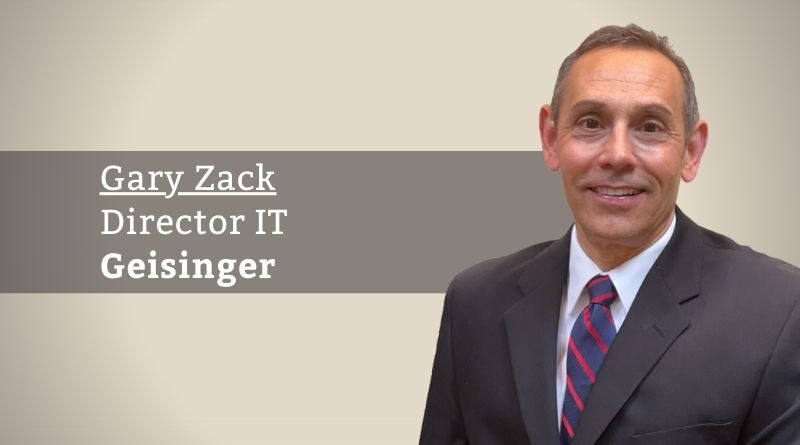Applying Intelligent Data Share Gateways for Evidence-Based Medicine and Spending
By Gary Zack, Director IT, Geisinger
The objective for any business is to run efficient operations to reduce costs. The healthcare industry can benefit by using the same mindset to add value to existing traditional data sharing processes to enhance patient care, reduce adverse medical events and medical procedure revision costs across the clinical industry. According to Kopel and White (2020), the shift in data sharing processes is essential as patients demand diagnosis based on evidence for physicians to make the best treatment decisions. Evidence-based medicine and spending depends on data provenance and receiving healthcare data timely using modern technology for to collect relevant patient data for making patient care decisions. Greenhalgh (2020) posited that evidence-based medicine depends on querying singular truth sources and applying linear logic to determine the best effects of physician intervention. According to Hasanpoor et al. (2020), evidence-based medicine reinforces physicians’ skills, which leads to quality health services and better cost management. The evidence-based approach augments the medicine decision process with data analytics to reduce the overuse of medical services to reduce costs (Hasanpoor et al., 2020). However, changing the traditional ways healthcare managers collect and share data to gain informed decision insights poses a competent resource effort and challenge. Healthcare leaders who are not aware or technically savvy to understand how to serve the next generation of healthcare consumers and use of the social media platform methods for real-time data sharing instinctively disjoin care responsibility between patient and physician leading to poor satisfaction scores.
Evidence-based medicine and spending potentially creates an environment that promotes greater knowledge and diagnosis insight to make informed decisions.
Healthcare managers can promote better healthcare and business sustainability by applying new technology approaches. The best way to provide guidance is to start with a small-scale proof of concept to gain data sharing trust and then scale iteratively for continuous process improvement. Many other factors such as overtreatment, technology development, insurer payment mechanisms that increase cost, regulations, patient values, and liability are part of the evidence-based medicine and spending equation. Zack (2020) proposed a pragmatic method to implement and promote a medium for user acceptance of data collection and sharing technology that involved redesigning the process for tracking medical devices and using Blockchain distributed ledger technology (DLT) to share the data ubiquitously to all providers involved in the care. The benefits of using DLT technology opposed to traditional Search Query Language (SQL) are the decentralized database management system, immutable audit trail, persistent availability, data provenance, and robust flexibility (Tsung-Ting et al., 2017). A DLT data-sharing platform in the healthcare system eliminates a single point of data connectivity failure for continuous health record availability (Tsung-Ting et al., 2017). Zack (2020) indicated that integrating medical device data in real-time is congruent to integrating complex electronic health record applications and a plethora of supporting medical application data, including physician contextual data, insurance claim, and device manufacturing data. Interfacing and integrating applicable healthcare data frameworks to capture contextual data and combining the relationship to measurement data adds semantic relevance and potentially improves treatment evidence. Eliminating interface and intermediary boundaries to collect and share data potentially allows the physician managers to obtain unique treatment insights by combining knowledge and prior performance to identify the best care value.
Sharing evidence-based healthcare data is essential to improve care quality through better health information system access and communication. Sharing healthcare data supports evidence-based medicine and can help clinical leaders to understand trends and patterns of disease and treatment outcomes to ensure better care quality (Yue et al., 2016). As advances in medical technology improve the treatment of disease, health care managers should consider implementing innovative strategies to redesign the health care monitoring process on a real-time continuous basis and leverage integrated healthcare data into a standard accessible format that is unambiguous. For instance, a standard format can contain clinical and contextual data, known as metadata, to provide effective data collection for effective understanding and treatment.
Improving the quality of health care decisions influences the delivery of medical care. Evidence-based medicine and spending potentially creates an environment that promotes greater knowledge and diagnosis insight to make informed decisions. Data alone may be insufficient, as many patients and providers are ill-equipped to make sense of the volume of detailed information that populates their EHRs and insurance claim repositories. Organizing and interpreting the data, historical content, scientific literature, and the health care resources available to them in their own communities can help in the health care decision process. Perhaps using a social media health care platform that is patient data-driven could potentially serve as a ubiquitous tool to collect relevant resources to establish reliable real-time evidence to conduct qualitative and quantitative systematic analysis for clinical and managerial practice. The lack of data connectivity and contextual communication between health systems, physicians, patients, and insurers impacts medical decisions. Implementing an integrative DLT technology in a social media type framework is a novel methodology that can evolve into an evidence-based approach having the potential to become the next gateway to better health care. Application of the DLT healthcare digital agnostic data medium has the potential to unlock the interoperability gateway challenges of volume, velocity, variety, and veracity to produce the most patient value pragmatically. Future work regarding data sharing platform management tools extends the knowledge to resolve the unknown gateway lock challenges. Social media platform designs are the next healthcare data sharing frontier that potentially combines functional semantic integration, semantic axioms, and network configuration to bridge the gap between healthcare standards, data, physicians, and patients. The novelty of the social media approach opens interoperability gateways that move the data closer to the user for better decisions for evidence-based medicine and spending.



